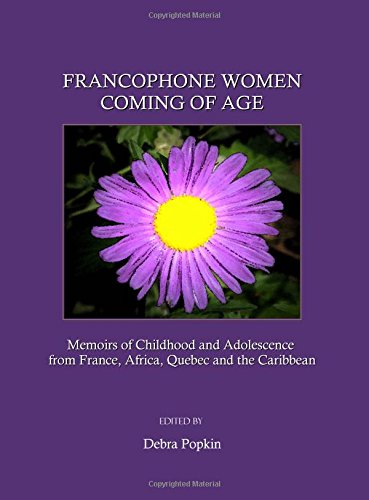(Ebook) Francophone Women Coming of Age: Memoirs of Childhood and Adolescence from France, Africa, Quebec and the Caribbean by Debra Popkin ISBN 9781847183224, 1847183220
This book began as a panel of University professors on the theme of Francophone Women, Coming of Age, Memoirs of Childhood and Adolescence, presented at the Northeast Modern Language Association Convention in Philadelphia, 2006. The essays center on the plight of growing up female in male-dominated Francophone cultures. Issues of culture, tradition, religion (Catholic and Muslim), parental conflicts and sibling rivalry are addressed in the works of authors from France, Quebec, Africa and the Caribbean. Authors whose memoirs and fiction are analyzed in this study span three continents Europe, North America (Quebec and the Caribbean) and Africa but they share a common search for identity and self-definition. Dr. Beth Gale (Clark University) analyzes role-play and the use of language in the works of Annie Ernaux (France) and Assia Djebar (North Africa). Post-colonial angst and cross-cultural misunderstanding are the focus of the study of Aminata Sow Fall s Douceurs du bercail (Senegal, West Africa) by Dr. Natalie Edwards (Wagner College). Two chapters focus on Caribbean authors, from Guadeloupe: Dr. Debra Popkin (Baruch College CUNY) analyzes Gisèle Pineau s special relationship with grandmother who gave her a sense of cultural identity; Dr. Leah Tolbert Lyons (Middle Tennessee State University) discusses the negative impact of the bad mothering in Myriam Warner-Vieyra s first novel, As the Sorcerer Said ... Three chapters are devoted to writers from French-speaking Canada: Dr. Myrna Delson-Karan (St. John s University) traces the portraits of children and adolescents in the works of Gabrielle Roy; Dr. Pascale Vergereau-Dewey (Kutztown University, Pennsylvania) explores the tormented childhood of Marie-Claire Blais s Pauline Archange; Dr. Edith B. Vandervoort (Defense Language Institute in Monterey) examines the search for identity and tortured father-daughter relationships in the novels of Gabrielle Gourdeau, Monique Proulx, and Marie Laberge (contemporary writers from Quebec), The seven chapters in this book explore the challenges faced by women from late 19th century through the 20th and into the 21st century as they gradually gained a voice to express their changing roles in society. Themes to be examined include sexual awakening, teenage pregnancy, and the rituals of coming of age. Conflicts occur between daughter and parents who inculcate traditional values and try to restrict their child's freedom. The importance of writing as a source of liberation and self-definition will be explored in light of the young girl s quest for freedom. Why write memoirs? Why write in French? These issues are discussed especially in cases where French is the language of the colonizer (Assia Djebar and Gisèle Pineau) or where French is essential to the preservation of one s cultural identity, as it is for Quebec writers. This book will be a fine resource for college and university professors and students in programs of French, Women's Studies, and French/Francophone Literature as well as African, Caribbean, and Quebec Studies.
*Free conversion of into popular formats such as PDF, DOCX, DOC, AZW, EPUB, and MOBI after payment.


